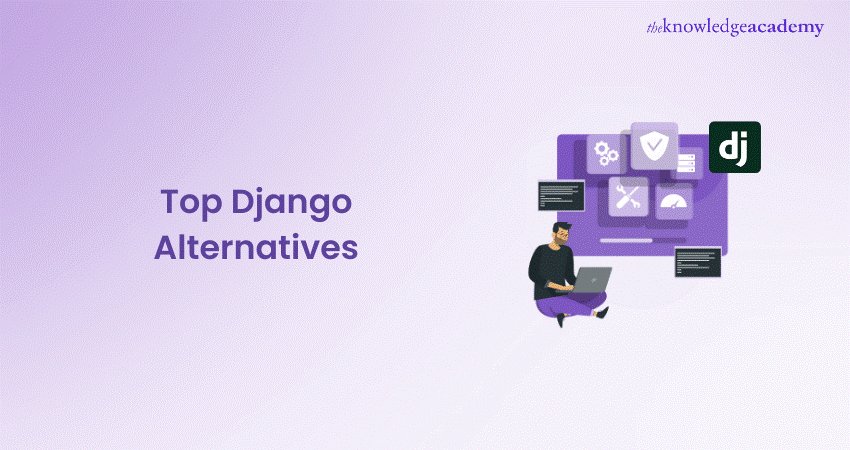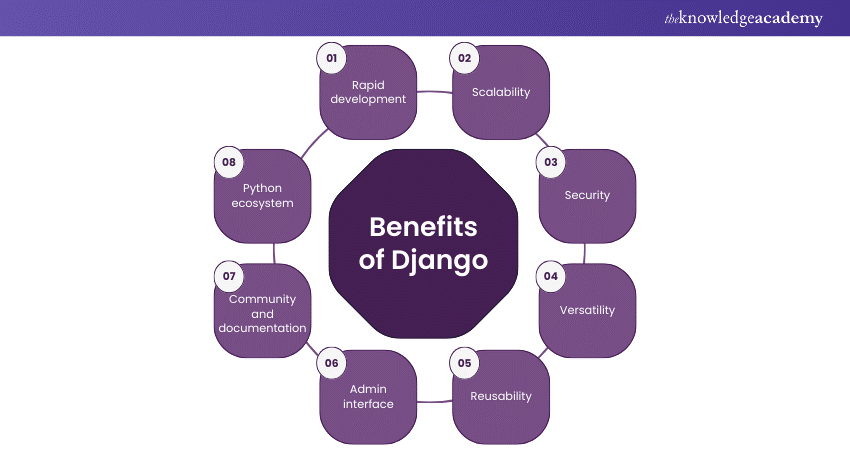We may not have the course you’re looking for. If you enquire or give us a call on 01344203999 and speak to our training experts, we may still be able to help with your training requirements.
We ensure quality, budget-alignment, and timely delivery by our expert instructors.

Among the many web frameworks, Django has reigned as the go-to framework for developers for quite a while. Django Interview Questions often address how developers must choose between different sets of tools for a given task, although Django also offers alternatives. Wondering what are the popular Django Alternatives?
Think of it as selecting the right car for a journey. While Django is like a reliable sedan, these top 10 Django Alternatives can be likened to various other vehicles that offer similar functionality but with their own unique features and advantages. Let's get to know these alternatives and find the ideal fit for your Web Development needs.
Table of Contents
1) What is Django?
2) Benefits of Django
3) Top 10 Django Alternatives
a) Ruby on Rails
b) Asp.Net
c) Flask
d) Spring Boot
e) Express.JS
f) Laravel
g) Bottle
h) Koa
i) CakePHP
j) Web2py
4) Conclusion
What is Django?
Django is a high-level Python web framework used in building web applications. It is an open-source web framework enabling the building of robust web applications. It supplies powerful toolkits, libraries, and functions that developers can easily use to scale up and secure a web application. Django is designed on an architectural pattern of Model-View-Controller (MVC) and stresses reusability, modularity, and rapid development. It is feature-rich with ORM (Object-Relational Mapping) for database access, URL route configuration, and a template engine with a built-in administration interface.
Benefits of Django

The benefits of using Django in Web Development are:
1) Rapid development: built-in features and conventions of Django help build web applications in the most effective way with a huge profit over time.
2) Scalability: due to high traffic load features like horizontal scaling, Django is perfect for projects of any size.
3) Security: To underline its security, the features of Django serve against web vulnerabilities quite well, such as cross-site scripting (XSS), and offer good protection against them.
4) Versatility: Django can be used in simple to complex types of web applications, from simple websites to complex data-driven platforms.
5) Reusability: Django is another framework because its design is reusability oriented. Thus, the reusability of code and libraries already available is provided in an application.
6) Admin interface: The admin is user-friendly to the back-end data of the application and is implemented through Django's built-in admin interface.
7) Community and documentation: Django has an active and big community that does contribute a lot to the areas of documentation, tutorials, and resources for support and learning.
8) Python ecosystem: Django actually plunges into the Python realm with open-handed bounty—liberal libraries, frameworks, and tools to offer new features and integrations.
Top 10 Django Alternatives
Here are the Top 10 Django Alternatives, read about each of them briefly and get to know which is the perfect alternative for you.
Ruby on Rails
Ruby on Rails, most commonly just called Rails, is a web framework having its source code written in Ruby. It follows the Model-View-Controller (MVC) architecture and conforms to convention over configuration. With elegant syntax and extensive libraries, Rails has poised development to be fun with its built-in rapid application development tools.
Attain in-depth knowledge of the Python framework for creating websites. Sign up for our Python Django Training.
ASP.NET
ASP.NET, the web framework from Microsoft for building robust and scalable web apps, is simple to use and easy to scale. The ones that can with ASP.NET write their code in any programming language like C# and Visual Basic, where Multiple View, Controller (MVC) design patterns are followed. ASP.NET intimately combines all Microsoft technologies, including a wide range of libraries and toolkits for building Web Development.
Flask
Flask is an easy web application framework written in Python, known for being easy and flexible. It provides developers with an opportunity to come up with web applications very quickly, with the least amount of required boilerplate code. Flask, in the context of Django vs Flask, offers all the features for web development in a project-based manner and has an easily extendable feature using a variety of Flask extensions.
Spring Boot
Spring Boot provides an easier and faster way of developing production-grade, stand-alone applications based on Spring with Java. The Spring Boot Interview Questions often emphasize that the Spring Boot project is opinionated and adopts convention over configuration.
With the vision of providing the functionality developed and deployed for enterprise web applications along with the minimum overhead of setup and configuration, Spring Boot naturally complements the other Spring projects and gives a wide range of functionalities for developing and deploying enterprise web applications. When preparing for Django Interview Questions, it's useful to compare such frameworks with Django, as both serve similar purposes in simplifying web application development while offering extensive features.
Express.js
Express.js is a fast and minimalist web framework for Node.js, designed to build rapid, scalable, and potent web applications and APIs. Express.js provides a clean but powerful feature set for developers to build effective server-side applications. It hosts a vibrant ecosystem and is most commonly used in the construction of lightweight, high-performance web applications, which is essential when learning to Create Superuser in Django.
Laravel
In terms of Software Development, Laravel is a framework focused on web applications with a concise and beautiful syntax in PHP. It follows the MVC architectural pattern; developers, consequently, have the skills to do highly modular and readable programs.
These are provided with ORM, the caching system, and an authentication system in Laravel, which is rich in features such as routing. On the other hand, the community of this language was very friendly during the ongoing documentation sessions. This language is believed to be more popular in PHP Web Development.
Try our Python With Machine Learning Training and begin your Data Science journey!
Bottle
Bottle is a very fast and lightweight Python web framework. Perfect for small projects or as a back end for HTTP APIs. It is designed with a very small and minimalistic source codebase that makes it perfect for tiny or small projects, with no dependency pile-up on third-party tools.
Koa
Koa is a modern web framework for Node.js, which was developed by the authors of Express.js. It embraces all the latest JavaScript features and provides developers with an undoubtedly more expressive and powerful tool in their hands. Koa is a well known framework equivalent to a web application development that only takes up a decent amount of memory.
CakePHP
Hailinging from PHP family, CakePHP is the PHP web framework that uses the MVC architectural pattern. Besides, the above framework contains such functionalities as ORM, validation, caching and scaffolding.
It is well-liked for the simple fact that, with the convention over configuration approach and its code generation ability, it allows the development of simple to massive web applications.
Web2py
Web2py is a full-stack web framework written in Python. It helps build secure and adaptable web applications with minimal effort, following simplicity and ease of use. It ships with an ORM, a web-based IDE, and a powerful administrative interface. It also concentrates on security defaults, making this a down-to-earth choice for applications with high-security necessities.
Conclusion
When exploring Django Alternatives, consider the unique features and advantages offered by each framework to find the perfect fit for your Web Development journey, a topic often discussed in Django Interview Questions. Whether it's the elegance of Ruby on Rails or the simplicity of Flask, there's a framework tailored to suit your project's needs and preferences.
Dissect Python’s intricacies with our comprehensive Python Course - sign up today!
Frequently Asked Questions
How to deploy a Django application?

Users frequently seek guidance on deploying Django applications to various hosting environments. This includes setting up the server, configuring static files, and using services like AWS Elastic Beanstalk or other platforms for deployment.
How to create and manage forms in Django?

Another common inquiry involves creating and managing forms. This covers everything from basic form creation using Django forms to handling form submissions and integrating forms with models for database interactions.
What are the other resources and offers provided by The Knowledge Academy?

The Knowledge Academy takes global learning to new heights, offering over 3,000 online courses across 490+ locations in 190+ countries. This expansive reach ensures accessibility and convenience for learners worldwide.
Alongside our diverse Online Course Catalogue, encompassing 19 major categories, we go the extra mile by providing a plethora of free educational Online Resources like News updates, Blogs, videos, webinars, and interview questions. Tailoring learning experiences further, professionals can maximise value with customisable Course Bundles of TKA.
What is the Knowledge Pass, and how does it work?

The Knowledge Academy’s Knowledge Pass, a prepaid voucher, adds another layer of flexibility, allowing course bookings over a 12-month period. Join us on a journey where education knows no bounds.
What are related Programming Courses and blogs provided by The Knowledge Academy?

The Knowledge Academy offers various Programming Courses, including Python Programming Course, Visual Basic Course and R Programming Course. These courses cater to different skill levels, providing comprehensive insights into Object Oriented Programming.
Our Programming Blogs cover a range of topics related to Programming, offering valuable resources, best practices, and industry insights. Whether you are a beginner or looking to advance your Programming skills, The Knowledge Academy's diverse courses and informative blogs have you covered.
Upcoming Programming & DevOps Resources Batches & Dates
Date
 Python Django Training
Python Django Training
Thu 26th Jun 2025
Thu 28th Aug 2025
Thu 23rd Oct 2025
Thu 4th Dec 2025






 Top Rated Course
Top Rated Course



 If you wish to make any changes to your course, please
If you wish to make any changes to your course, please


